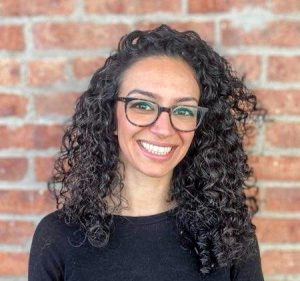By Adam Stone

For Saman Behbahani, J.D. ’08, personal contacts have helped define a career trajectory.
She started out in real estate law — in 2008 there was plenty of work in that arena. (“The people were lovely, but the work was horrible. I basically was kicking people out of their houses,” she says.) A friend from UBalt Law got her a first clerkship, in the Montgomery County, MD, Circuit Court. From there, a friend from her undergrad days recruited her onto the legal team at National Geographic.
“UB really emphasized the value of networking, and that’s what brought me to where I am today,” she says.
At NatGeo she read 10 years’ worth of television contracts and learned how that industry works. She jumped to Viacom in New York, did a stint at AMC Networks, and two years ago moved to NBCUniversal, where she serves as vice president of legal affairs.
If that sounds like a cool gig … it is.
Behind the scenes …
At NBCUniversal, “I lead a small but mighty team of attorneys, and we license scripted content,” Behbahani says.
“The scripted television content that you see on NBC or on any of the cable networks or streaming on Peacock, anything that our own studio does not make, we license,” she says. “We work closely with our business-affairs colleagues and negotiate these deals, draft contracts, analyze any rights questions. Intellectual property and copyright law are the foundation of what we do, but really it’s about making deals and drafting contracts for long-term licenses of content.”
Entertainment law covers a lot of ground, and some of it isn’t what you would expect. Beyond securing the rights to content, she says, “We make sure that nobody’s injured, that nobody’s rights are infringed on through the process of creating the content.
“We also want to make sure there’s respect in the workplace,” she adds.
“Training for every single person that comes into contact with any of our productions: That’s really big and very important,” she says, and it all has to be written into the contracts. “Everyone needs to feel safe on set, and in writing rooms. Everyone should be valued and their opinions valued. Storytelling also has to be very sensitive. When we license shows, we take that responsibility very seriously.”
A fast-changing field
In the midst of all this, Behbahani gets to be part of the effort to define new legal strategies in an industry that is very much in flux.
Entertainment law has been evolving since she got into the field in 2011, “and in the last four years it has changed even more dramatically,” she says. “The move to streaming is huge. The way people get content, the amount of content available — it has changed everything we do.”
The new landscape has required a legal reset of sorts. “It’s not just the rights, it’s even the definitions: What is streaming? What is VOD (video on demand) versus what are digital rights?” Behbahani says.
And there are pandemic curveballs that linger. The pandemic pushed a lot of television production overseas, where it remains, “and a lot of the production rules change in different countries,” she says. All that impacts the work of the legal team.
Behbahani falls back on her UBalt Law training in order to navigate this complex landscape.
“One of the biggest things that the law school was proud of was the hands-on practical learning. I didn’t come out of law school with just book knowledge,” she says. “I had an externship my first summer after school and then did the immigration law clinic. I also interned at the courthouse because one of my professors, The Hon. John F. Gossart, Jr., was an immigration judge, and I clerked for him.”
All that practical experience in turn supports agility, the capacity to pivot when needed.
“It’s the ability to have a bigger picture view, to see opportunities. That kind of agility is what allows you to work towards ‘yes.’ My clients are creatives,” she says, “and my job is to make sure that what they want to happen, happens. So the answer is always yes: Let’s just figure out how.”
Adam Stone is a writer based in Annapolis.
